Recent Fire Damage Posts
Christmas Safety Tips for a Safe Holiday Season in Layton, UT
11/22/2024 (Permalink)
As the holiday season approaches in Layton, UT, families and communities come together to celebrate and decorate. Amid the joy of Christmas lights, seasonal decorations, and gatherings, safety should be a priority to avoid accidents or emergencies. Taking extra care during this time can help prevent fire hazards, injuries, and damage to your home, ensuring your holiday season remains merry and bright. Here are essential Christmas safety tips from SERVPRO of Layton to help protect your family, home, and holiday spirit.
1. Christmas Tree Safety
The Christmas tree often stands as the centerpiece of holiday décor, but it can also be a significant fire hazard if not handled properly.
Choose a Fresh Tree: If you’re opting for a real tree, choose one with green, flexible needles that do not fall off easily. Dry trees are more susceptible to catching fire.
Keep it Hydrated: Check the water level daily and keep your tree stand filled with water to prevent it from drying out.
Keep it Away from Heat Sources: Place your tree at least three feet away from heat sources like fireplaces, radiators, and heaters. Avoid blocking exits with the tree, as it may obstruct escape paths during an emergency.
Turn Off Lights Before Bed: Ensure all tree lights are turned off when leaving the house or going to bed to prevent electrical fires.
2. Safe Holiday Lighting
Christmas lights bring warmth and cheer, but electrical issues can lead to accidents if not managed with care.
Inspect Before Use: Check all lights for damaged wires, frayed cords, or loose connections before putting them up. Discard any that show signs of wear.
Use Outdoor-Approved Lights: Only use lights labeled for outdoor use if placing them outside, as these are designed to withstand weather conditions in Layton.
Limit Extension Cord Use: Avoid overloading extension cords by plugging in too many lights or decorations, as this can cause overheating and pose a fire risk.
Secure Lights Carefully: Avoid using nails or staples to secure lights, as they can damage the wires. Instead, use plastic hooks or clips that are safer and easier to remove.
3. Candle Safety
Candles add ambiance to the holiday season but can quickly turn dangerous if left unattended or used incorrectly.
Keep Away from Flammable Materials: Place candles at least a foot away from anything that can catch fire, such as curtains, decorations, or the Christmas tree.
Use Stable Holders: Set candles in sturdy holders to prevent them from tipping over. Place them on a stable surface that is out of reach of children and pets.
Never Leave Unattended: Always extinguish candles when leaving the room or going to sleep. Consider switching to flameless LED candles, which provide the same ambiance without the fire risk.
4. Fireplaces and Chimneys
A cozy fire in the fireplace is a Christmas classic, but improper use can lead to accidents and smoke damage.
Clear the Area Around the Fireplace: Keep flammable items, including Christmas stockings and décor, a safe distance away.
Inspect and Clean: Have your chimney inspected and cleaned annually to avoid dangerous creosote buildup, which can lead to chimney fires.
Use a Fireplace Screen: Use a sturdy screen to prevent embers from escaping onto your floors or carpets. It can also help protect children and pets from accidental burns.
5. Kitchen and Cooking Safety
The holiday season is often filled with family feasts and gatherings, making the kitchen a central hub. However, it’s also a place where accidents can happen without careful attention.
Never Leave Cooking Unattended: Stay in the kitchen while frying, grilling, or broiling food. If simmering, baking, or roasting, check on the food regularly.
Keep Flammable Items Away: Keep oven mitts, wooden utensils, food packaging, and towels away from the stove and open flames.
Use Timers: Set timers to remind yourself when to check on food, especially when preparing multiple dishes.
Turn Pot Handles Inward: Prevent accidental spills and burns by ensuring all pot handles face inward and away from the edge of the stove.
6. Child and Pet Safety
Christmas can be particularly exciting for children and pets, who may be curious about the decorations. Take steps to ensure their safety.
Keep Breakable Ornaments Out of Reach: Place fragile and potentially harmful decorations higher up on the tree to prevent accidents.
Avoid Toxic Plants: Certain holiday plants, like poinsettias, holly, and mistletoe, can be toxic if ingested by children or pets. Consider using artificial alternatives or keeping these plants out of reach.
Use Battery Covers: Keep battery covers secure on toys and decorations to prevent children from accessing small parts that could be swallowed.
7. Avoiding Common Electrical Hazards
Many holiday decorations are electrical, increasing the risk of electrical fires if not used with caution.
Don’t Overload Outlets: Plugging in too many devices or decorations into a single outlet can overload the circuit, causing overheating and potentially sparking a fire.
Use GFCI Outlets for Outdoor Decor: When setting up outdoor lighting, use Ground Fault Circuit Interrupter (GFCI) outlets, as they can cut off the power if any electrical issues arise.
Check for UL Certification: Only purchase decorations and lights that are UL-listed or certified by another safety organization. This certification indicates they’ve been tested for safety.
8. Preventing Slip-and-Fall Accidents
Ice, snow, and clutter from holiday preparations can create slip-and-fall hazards around the home.
Keep Walkways Clear: Shovel snow and apply salt to walkways and driveways to prevent icy patches. Clear away any extension cords or decorations that might be a tripping hazard.
Organize Indoor Spaces: Keep decorations, toys, and gifts organized to avoid clutter that could lead to tripping.
Use Sturdy Ladders: If you need to reach high places, like hanging lights or placing decorations, use a stable ladder instead of standing on furniture.
9. Preparing for Emergencies
Despite careful planning, emergencies can still occur. Prepare your home and family with an emergency response plan.
Install and Test Smoke Alarms: Make sure smoke alarms are installed on every level of your home and test them monthly to ensure they work properly.
Have Fire Extinguishers Available: Place a fire extinguisher in key areas like the kitchen and near the Christmas tree. Make sure everyone in the household knows how to use it.
Create an Escape Plan: Discuss and practice a fire escape plan with your family, including a safe meeting place outside your home.
10. Holiday Travel Safety
If you’re planning to leave Layton for the holidays, secure your home to prevent incidents while you’re away.
Unplug Decorations: Turn off and unplug all holiday decorations to reduce fire risks in your absence.
Lock Windows and Doors: Ensure all entry points are securely locked to deter potential break-ins.
Ask a Neighbor to Keep an Eye: If possible, have a trusted neighbor check on your home periodically, especially if severe winter weather is forecasted.
Final Thoughts
A little extra care can make a big difference in keeping your home safe during the Christmas season. By following these tips, you can enjoy the holidays in Layton with peace of mind, knowing that your loved ones and property are protected.
If you encounter any unexpected issues, such as water or fire damage during the holidays, SERVPRO of Layton is Here to Help® with prompt and professional restoration services. Wishing you a joyful and safe Christmas season from our team to yours!
Essential Fire Safety Tips for Residential Homes in Layton, UT
7/18/2024 (Permalink)
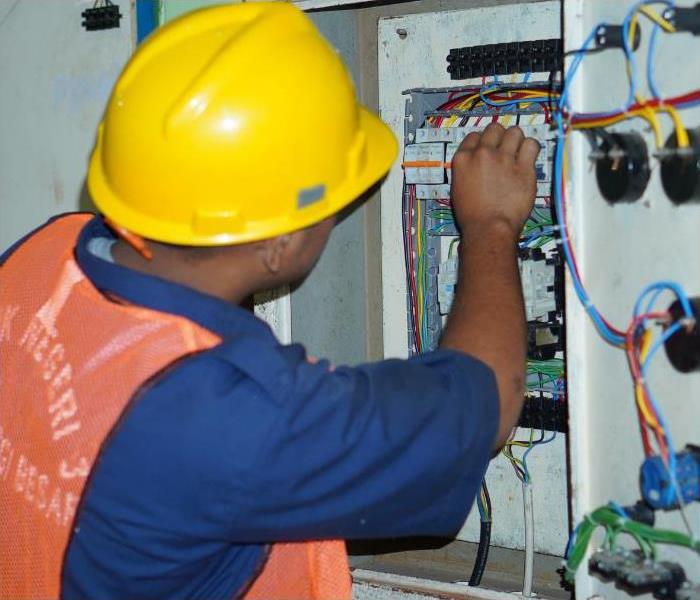 Crucial Fire Safety Tips for Homes in Layton, UT
Crucial Fire Safety Tips for Homes in Layton, UT
Fire safety is a critical concern for homeowners in Layton, UT, and across the country. Every year, thousands of homes are damaged or destroyed by fires that could have been prevented with proper precautions. In this comprehensive guide, we'll explore essential fire safety tips tailored specifically for residential homes in Layton, UT. By following these guidelines, you can significantly reduce the risk of fire and protect your home and loved ones.
1. Install and Maintain Smoke Alarms
Smoke alarms are your first line of defense against fires. Install smoke alarms on every level of your home, including inside each bedroom and outside sleeping areas. Test them monthly to ensure they are working properly, and replace batteries at least once a year. In Layton, UT, where winters can be cold, check that smoke alarms are not affected by extreme temperatures or drafts.
2. Have a Fire Escape Plan
Develop a fire escape plan and practice it with your family regularly. Identify at least two ways to escape from every room, especially bedrooms. Choose a meeting place outside the home where everyone will gather after escaping. Make sure that windows and doors can be easily opened from the inside and that security bars have quick-release mechanisms.
3. Keep Fire Extinguishers Handy
Place fire extinguishers in key locations such as the kitchen, garage, and workshop. Ensure that everyone in the household knows how to use them. The acronym PASS is a useful guide: Pull the pin, Aim the nozzle at the base of the fire, Squeeze the handle, and Sweep from side to side.
4. Practice Kitchen Safety
The kitchen is a common area where fires start. Never leave cooking unattended, especially when frying, broiling, or grilling. Keep flammable items like towels, paper towels, and curtains away from cooking appliances. If a grease fire occurs, carefully slide a lid over the pan and turn off the burner. Do not attempt to extinguish a grease fire with water.
5. Maintain Heating Equipment
If you use space heaters, keep them at least three feet away from anything that can burn, such as curtains, bedding, and furniture. Turn off space heaters when leaving the room or going to bed. Ensure that chimneys and vents are cleaned and inspected annually by a professional to prevent chimney fires and carbon monoxide buildup.
6. Practice Electrical Safety
Inspect electrical cords for fraying, damage, or signs of overheating. Avoid overloading outlets and extension cords, and never run cords under rugs or furniture. Consider installing AFCI (Arc-Fault Circuit Interrupter) outlets, which detect and mitigate electrical arcing to reduce the risk of electrical fires.
7. Store Flammable Materials Safely
Keep flammable liquids, such as gasoline, propane, and paint thinner, in tightly sealed containers in a well-ventilated area away from heat sources. Store them outside the home if possible, in a detached garage or shed. Never smoke near flammable materials or use them near open flames or sparks.
8. Install Fire-Resistant Materials
Consider using fire-resistant building materials when renovating or building your home. This includes fire-resistant roofing materials, siding, and insulation. Ensure that attic vents are equipped with spark arrestors to prevent embers from entering and igniting combustible materials.
9. Be Mindful of Smoking Hazards
If you smoke, do so outside and use deep, sturdy ashtrays. Never smoke in bed or when drowsy, and ensure that cigarette butts are fully extinguished before disposal. Consider quitting smoking altogether to eliminate this fire risk.
10. Educate Your Family and Guests
Educate your family members, especially children, about fire safety and the importance of fire prevention measures. Inform guests about your fire escape plan and designated meeting place. Encourage everyone in your household to be vigilant and proactive in fire safety practices.
By implementing these fire safety tips tailored for residential homes in Layton, UT, you can significantly reduce the risk of fire and protect your home and loved ones. Remember, fire safety is a collective responsibility that requires ongoing awareness and proactive measures. Stay informed, stay prepared, and prioritize safety in every aspect of your home life.
Safety in the Kitchen: How to Extinguish a Grease Fire and Restore Your Layton, UT Home with SERVPRO of Layton
10/23/2023 (Permalink)
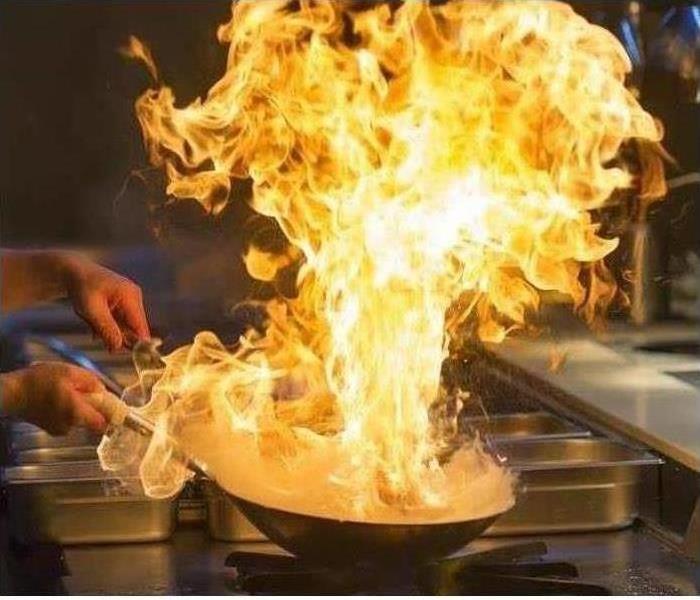 Grease fires are very common in Layton, UT.
Grease fires are very common in Layton, UT.
The kitchen is often considered the heart of a home, where the delightful aroma of home-cooked meals wafts through the air. However, amidst the culinary delights, the kitchen can also be a potential fire hazard, especially when it comes to grease fires. In this comprehensive blog post, we'll dive deep into the world of grease fires and explore everything you need to know about preventing and extinguishing them in your Layton, UT home. Additionally, we'll shed light on how SERVPRO of Layton can be your guiding light in restoring your home if you ever face a fire-related emergency.
Understanding Grease Fires
Grease fires are among the most common kitchen fires and can turn dangerous in the blink of an eye. They occur when cooking oil or fat becomes too hot and ignites. Unlike other fires, grease fires have their unique characteristics that require specific actions for safe extinguishing.
Why Do Grease Fires Happen?
Grease fires primarily occur due to overheating. When the oil or fat in a pan or pot surpasses its smoke point and reaches its ignition temperature, a spark, or even a tiny droplet of water, can lead to a blazing inferno. Common reasons for grease fires include:
High Cooking Temperatures: Frying or deep-frying often requires high temperatures that can easily ignite the oil or fat.
Cooking Frozen Food: The introduction of frozen foods into hot oil can cause sputtering, leading to grease fires.
Oil Splatter: Any sudden movement or dropping of food into hot oil can cause oil to splatter, creating the potential for a fire.
Old or Contaminated Oil: Oil that has been reused multiple times or is contaminated with food particles is more likely to catch fire.
Identifying a Grease Fire
Grease fires are distinguishable by their distinct characteristics:
- Intense flames that may be accompanied by smoke.
- A popping or crackling sound.
- Fire localized in the pan or pot, but it can quickly escalate if not managed.
How to Extinguish a Grease Fire
If you ever find yourself facing a grease fire in your Layton, UT home, follow these steps to ensure your safety and the safety of your loved ones.
Don't Panic: Stay calm. Panic can lead to poor decision-making. Remember, you have the knowledge and tools to manage the situation.
Turn Off the Heat: If safe to do so, turn off the heat source. This step helps prevent the fire from growing further.
Cover with a Lid: If the fire is still relatively small and manageable, use a metal lid or a baking sheet to cover the pan. This action will smother the flames by cutting off the oxygen supply.
Avoid Water: Never use water to extinguish a grease fire. Water will only make it worse by splattering the hot oil and spreading the fire. Moreover, it can lead to steam burns.
Baking Soda: If available, carefully sprinkle baking soda over the fire. Baking soda is a fire suppressant and can help smother the flames.
Fire Extinguisher: Keep a Class K fire extinguisher in your kitchen, specifically designed for grease fires. If you're comfortable using one, follow the manufacturer's instructions to discharge it safely.
Call 911: If the fire becomes uncontrollable or starts spreading beyond the cooking area, don't hesitate to call 911 for professional assistance. Your safety should always be the top priority.
The Importance of Fire Safety
The adage "prevention is better than cure" holds particularly true when it comes to grease fires. Here are some practical tips to prevent grease fires in your kitchen:
Stay Vigilant: Never leave cooking unattended, especially when using high heat or oil.
Use a Thermometer: Invest in a cooking thermometer to monitor oil temperature when frying.
Keep a Lid Nearby: Always have a metal lid or a baking sheet close to your cooking area. You can use it to smother a potential fire if it occurs.
Keep the Area Clean: Regularly clean your stovetop and oven to remove any built-up grease or food particles that could catch fire.
Properly Dispose of Used Oil: Dispose of used cooking oil or fat safely and responsibly. Never pour it down the drain or throw it in the trash.
SERVPRO of Layton: Your Partner in Restoration
Extinguishing a grease fire is just the first step in the journey. Even after successfully putting out the fire, you may still have to deal with the aftermath, including smoke and fire damage to your home. This is where SERVPRO of Layton comes in as your trusted partner.
Our Expertise in Fire Damage Restoration
SERVPRO of Layton specializes in fire damage restoration, understanding the unique challenges posed by grease fires. Our highly trained professionals possess the expertise and equipment to restore your home to its pre-fire condition, ensuring you can get back to your daily routine as soon as possible.
Our Services Include:
Assessment: We assess the extent of the damage, taking into account not only the visible fire and smoke damage but also potential hidden issues.
Smoke and Soot Removal: SERVPRO uses advanced techniques to remove smoke and soot residues from surfaces, ensuring a clean and safe environment.
Odor Removal: Smoke leaves behind a persistent odor that can be challenging to eliminate. SERVPRO employs specialized equipment and techniques to effectively remove these odors.
Structural Restoration: Whether it's repairing damaged walls, ceilings, or flooring, SERVPRO has the expertise to restore your home to its pre-fire condition.
In conclusion, grease fires can be both terrifying and dangerous, but with the right knowledge and actions, you can protect your Layton, UT home. Safety is paramount when dealing with these fires. Remember to stay calm, follow the correct steps for extinguishing, and never hesitate to call 911 if the situation gets out of control.
SERVPRO of Layton is your dedicated partner in fire damage restoration, ensuring your home is returned to its former glory. Your kitchen is where wonderful memories are created, and it's our mission to make sure you can continue doing so in a safe and secure environment. Stay safe, and always be prepared!
Avoid a Candle Fire With Safe Habits and Alternatives to Open Flames
8/31/2023 (Permalink)
 Avoid a Candle Fire in your Layton, UT house by following these important tips.
Avoid a Candle Fire in your Layton, UT house by following these important tips.
The soft flicker of a flame is soothing and comfortable. For many homeowners, the gentle scents and appearance of candles provide a calming, peaceful atmosphere. Unfortunately, candle fire is also responsible for a lot of home damage:
Avoid Fire Damage by following these tips
At least 2% of home fires are caused by candles.
Just a few years ago, there was an average of 20 candle fires are reported each day, and today there are more than 10,000 each year. Fires due to candles peak during December and January.
These facts come from the National Fire Protection Association and their research division. Looking at these statistics, is it possible to safely use candles in your home?
Prevent a Candle Fire From Destroying Your Home
The good news is that today there are plenty of options for getting the same ambiance from candle fire without the risks associated with open flames. If you do plan to use the real thing, be sure to take the following precautions:
- Clear the area around the candle. Plants, decorations, linens, and other flammable items all pose fire hazards.
- Position candles where children, pets, and blowing curtains won't knock them over. Make sure candles are placed on a sturdy, level surface.
- Never leave candles unattended; many fires occur when homeowners fall asleep and more than a third of home candle fires started in bedrooms.
- Store candles, matches, and lighters where children can't reach them.
Habits for Proper Care of Candles
In addition to these foundational safety habits, there are several other things you can do to improve your well-being around candles. Trim candlewicks to about a quarter of an inch. If the wick is too short, the flame won't burn correctly. If the wick is too long, it will cause the flame to flare and flicker. Flares can lead to fires.
Take the heat of candles into account. Some candleholders (such as wine bottles) aren't sturdy or heat-resistant enough to withstand the burning heat. The rising temperature can cause glass holders to crack, spilling out wax and potentially causing a candle fire. It's also important that you place candles at least 3 to 4 inches apart and avoid handling candles before they cool.
Alternatives to Open Flames
Many fire safety authorities (as well as fire damage cleanup and restoration professionals) recommend using alternatives to candles. One of the most popular of these is the flameless candle. These are available in many sizes, shapes, and colors. Some are remote-operated, and many use an LED bulb that mimics the flicker of a candle flame. You can even find these candles with a warm vanilla scent. Some of the other options to consider include reed diffusers, wax warmers, humidifiers with essential oils, and strings of fairy lights.
The best way to avoid fire and smoke damage, as well as the cost of fire and smoke cleanup, is to take preventative steps and improve fire safety in your Layton, UT, home. This includes the installation of fire extinguishers and fire and smoke alarms. Develop the appropriate habits for enjoying an open flame and learn to properly maintain your candles. Best of all, consider an alternative. Don't let your peaceful evening end with destructive candle fire.
3 Steps for Restoring Your Home to Its Pre-Fire Condition
9/13/2022 (Permalink)
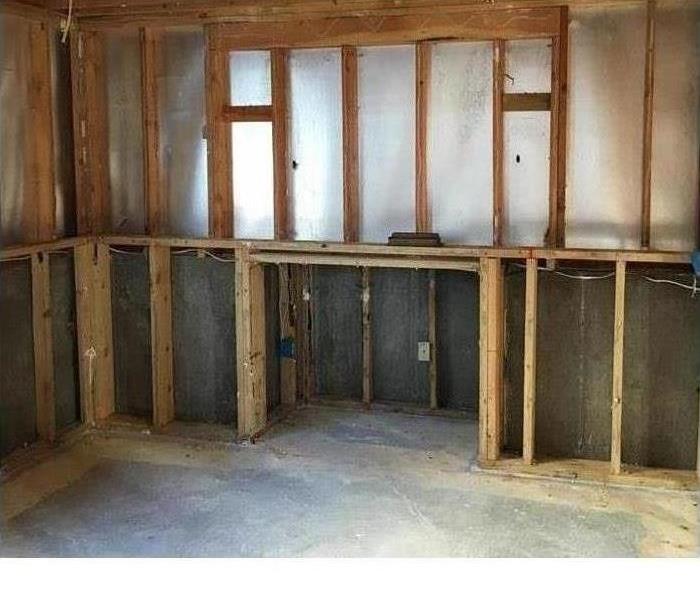 This Layton, UT home suffered from smoke and fire damage
This Layton, UT home suffered from smoke and fire damage
No homeowner wants to watch his or her Layton, UT, home go up in flames. Whether your house has survived a minor, moderate, or severe fire, you likely want to begin cleanup as soon as possible. As part of a complete cleaning process, restoring your home involves dealing with fire, soot, and smoke damage.
Three Steps For Fire Damage Restoration
- 1. Overall Structure
Fires often weaken studs and floor joists. They may also ruin drywall and tile. The first step in any fire-cleanup process is to evaluate the safety and habitability of the home. Once a professional deems the house is safe to occupy, cleanup can begin. Technicians have the skill, equipment, and knowledge to remove fire marks and other remnants from surfaces throughout the home.
- Accumulated Soot
Soot can be as bad or worse than fire or smoke damage. Not only does accumulated suit discolor walls and carpeting, but it can also ruin furniture and personal keepsakes. Unfortunately, you may have to throw away uncleanable items. Some, however, are probably salvageable. Since you are not an expert, you likely can’t know which items to preserve and which ones to toss. As part of the cleaning process, restoration technicians do the analysis for you.
- Smoke Infiltration
As you probably know, smoke can work its way into small places throughout your home. Even if you haven’t sustained much fire damage, you may have a tremendous amount of smoke infiltration. To effectively remove smoke, professional restorers use a variety of smoke-cleaning techniques. In addition to replacing HVAC filters and scrubbing walls, technicians often rely on ozone machines to remove smoke odors.
Fire damage, soot damage and smoke damage can destroy the comfort, value and appearance of any home in Layton, UT. Fortunately, you don’t have to deal with the negative effects of fires. By working with the right restoration service, you can likely return your home to its pre-value condition.
Top 5 Causes of Residential Fires
7/12/2022 (Permalink)
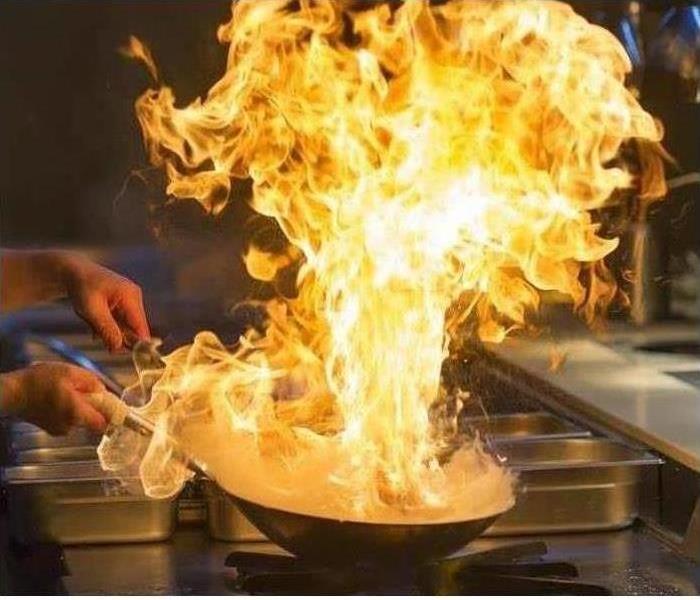 Cooking fires are the leading cause of fire damage in Layton, UT.
Cooking fires are the leading cause of fire damage in Layton, UT.
A property owner's worst fear is a residential disaster, like a home fire. Unfortunately, even with vigilant homeowners, some fire disasters are unavoidable. However, don't call in the fire cleaning specialists from Layton, UT, just yet. Being aware of the five leading causes of home fires can reduce your risks.
The 5 Leading Causes of Home Fires
- Cooking
- Faulty wiring
- Smoking
- Appliances
- Candles
- Cooking
Cooking can quickly lead to fire damage, especially when working with grease. A grease fire can get out of control if you don't smother it immediately. While you can allow the pan fire to burn itself out if it is small and away from flammable materials, it is best to put a lid on it and remove it from the heat source.
- Faulty Wiring
Older homes may have wiring issues. First, the codes today do not match those from a decade or more ago. Second, if you recently purchased the property, you do not know who performed past wiring work or upgrades. It is wise to have an electrical inspection done to ensure everything is up to code and safe.
- Smoking
Smoking in bed or relaxing in the living room can cause a home fire. If you fall asleep with the lit cigarette in your hand, it is possible the embers or the cigarette will ignite furniture or carpeting around you.
- Appliances
Every appliance in your home likely has a maintenance schedule and cleaning instructions. Be sure to obey the guides provided by the manufacturer. It is also a good idea to unplug appliances not in use.
- Candles
Many homeowners like candles, especially those with a pleasant fragrance. However, if you have children or pets, make sure you do not leave a lit candle unattended. Children are curious, and pets can be reckless.
While a home fire is a concern for many homeowners, knowing the common causes of house fires can limit your risks. If you wish to discuss or assess issues regarding your property, contact a fire prevention expert.
Safer Candle Alternatives
6/22/2022 (Permalink)
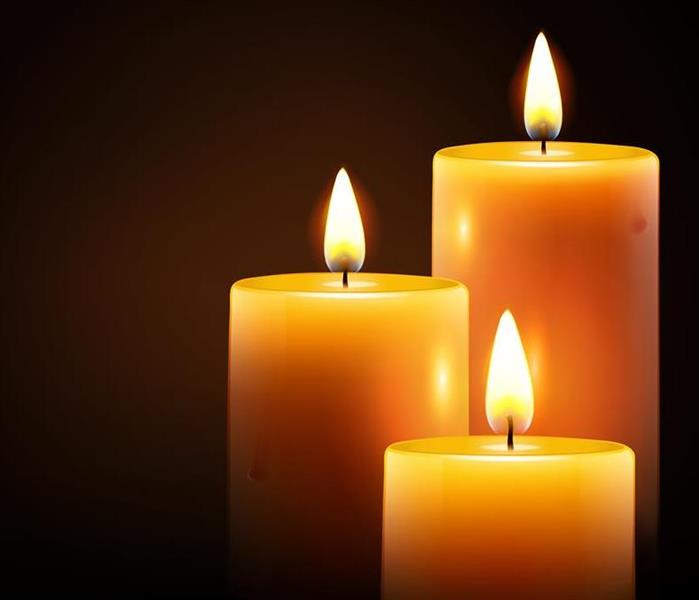 Avoid Candle Fires by following our Tips.
Avoid Candle Fires by following our Tips.
Their pleasing scents and warm glows make candles a popular addition to many people's home decor. Candles can also be useful for times when the power is out. However, they can pose a fire risk. Consider these safer candle alternatives.
Avoid a Candle Fire
The holidays are the most common time of year for candle fires to occur, but they can happen at any time. Using one of these popular candle alternatives can help you avoid this risk:
1. Essential Oil Diffusers
If you are burning candles for the scent, rather than the light, consider using an essential oil diffuser. These diffusers are either battery operated or plug into a wall outlet and you can use many different scents with them including popular holiday choices, such as pine trees and pumpkin spice.
2. Flameless Candles
If you want the experience of candlelight without the fire risk, try a flameless candle. These are usually battery-operated, so you can still use them during a power outage. They don't give off a scent or generate any heat, which may make them a good alternative for summer months and for people who have scent sensitivities.
3. Wax Warmers
Wax warmers melt scented wax cubes to create the smell of burning a candle without the open flame. You can adjust the strength of the scent by increasing or decreasing the amount of wax you melt at one time. Because these items generate heat, they are not completely risk-free, but the fire risk is much lower than with an open flame.
4. Reed Diffusers
Reed diffusers aren't as powerful as electronically powered diffusers, but you don't have to change batteries or plug them in and they consistently dispense scents for weeks at a time. This is a good option if you want to use a diffuser in an out of sight area, such as a cabinet, or a location without easy access to an electrical outlet.
5. Room Sprays
Another flameless way to make your home smell nice is to use a room spray. Some of your favorite candle brands produce sprays and you can purchase automatic dispensers to keep your home smelling fresh all day.
Candle Safety Tips
According to the National Fire Protection Association, more than 8,200 house fires are started by candles every year. These fires can cause significant damage that requires restoration services in Kaysville, UT.
If you decide to use candles, use them safely. Never leave a burning candle unattended. If you must leave the room, blow out the candle first and make sure it is out. Do not place candles near flammable objects, such as curtains, furniture, carpets, paper, books, bedding and flammable decorations. Avoid touching open flames with your hair or clothing.
Do not put burning candles where pets or children can access them or where they can easily be accidentally knocked over. Avoid placing candles near vents or drafts. Don't move a candle while it is still lit or while any melted wax is liquified. Keep all candles at least three inches apart.
Candle fires can cause a significant amount of property damage. To avoid this risk, use candles safely and consider using candle alternatives.
5 Benefits of Emergency Board Up Services
3/14/2022 (Permalink)
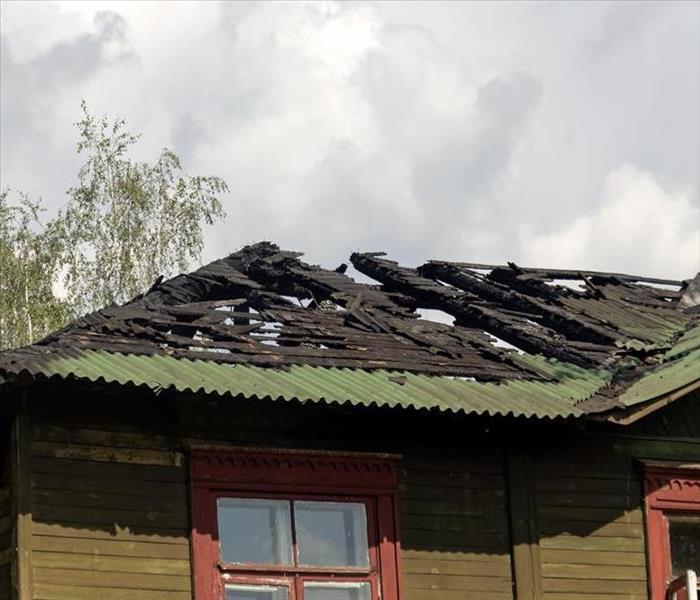 Discover the Benefits of Emergency Board Up Services. If you have more doubts, just contact us.
Discover the Benefits of Emergency Board Up Services. If you have more doubts, just contact us.
The aftermath of a fire in your Layton, UT home is a stressful and chaotic time. Along with determining the losses, calling the insurance company and finding a professional fire damage company, it also means waiting for restoration to begin.
During that time, securing board up services is essential to minimize loss. These specialized companies are available 24/7 and have the expertise and equipment to complete tasks from winterizing a property to cleaning up glass and stabilizing the structure. Below are three ways these services help.
Benefits of Emergency Board Up Services
1. Protect Insurance Coverage
In many situations, the insurance company will require you to do an emergency board up. Depending on the damage, this may mean tarping a roof, boarding up windows or installing a temporary fence around the property. If you don’t take action, you may risk getting full compensation for your losses.
If additional damage is sustained due to openings, you will likely have to cover those costs out of pocket. The faster you find the right provider, the better the odds that additional damage won’t happen.
2. Minimize Secondary Damage
Any openings in the home are ripe entries for Mother Nature to wreak havoc in many forms. While waiting for repairs, a sudden rainstorm or high winds may cause more damage. Water is the most important thing to keep from entering the home. Along with smoke and soot damage, unwanted water leads to potential mold growth and possible degradation of the structure. Using board up services also helps keep pests away. Rats, raccoons, mice and other creatures love finding new shelter. Once inside, they have no qualms about leaving a big mess behind.
3. Deter Vandals
After a fire, there is a good chance that you will have to secure a temporary residence. This means your home has a higher risk of vandals and thieves taking a look around. Along with stealing valuable belongings, such as electronics and appliances, they may also be on the lookout for precious metals in plumbing fixtures. On top of looting, they may easily cause other damage that adds to the headache.
4. Minimize Liability
After a fire, there is often debris and other potential risks laying in wait. Along with providing temporary coverings for openings, many providers also ensure that the perimeter around the home is free of debris, limiting the chances of an accident from happening.
5. Ease the Claim Process
When you find a trusted provider, you also get peace of mind that they will be working directly with your insurance company. This helps speed up the entire process, which is always a good thing in this type of situation. By working with the insurer, they will have a good grasp of the damage and what needs to be done. This frees you up to focus on other aspects of the loss, such as temporarily relocating and organizing possessions.
When a fire breaks out in your home, it leaves much more behind than just soot and smoke damage. Securing the property with board up services is essential to prevent additional damage and lets you focus on getting back on track.
Fire Damage: Renters Insurance Coverage
2/23/2022 (Permalink)
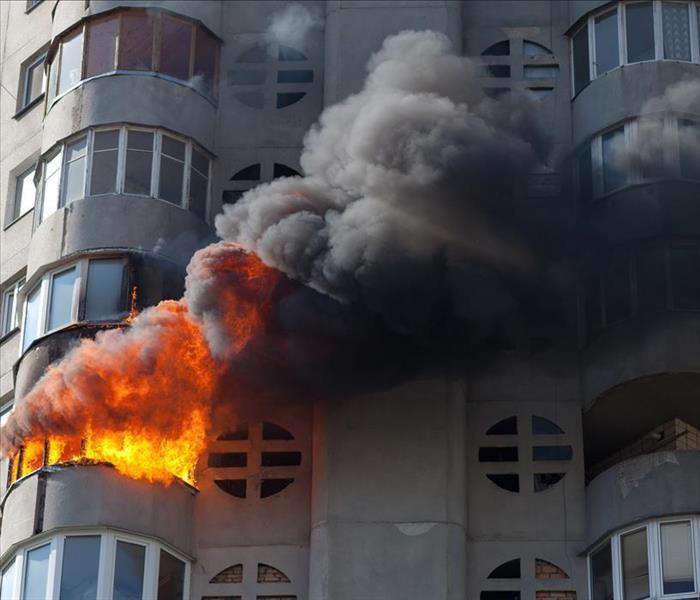 Learn more about Renters Insurance Coverage by following these Tips. If you need more Information, just contact us.
Learn more about Renters Insurance Coverage by following these Tips. If you need more Information, just contact us.
Anyone living in an apartment likely understands the concept of renters insurance. It is a low-cost insurance policy designed to protect the contents of the renter's apartment. Not all apartments complexes or landlords will require renters insurance, but most restoration services in Layton, UT, recommend all renters get coverage.
There is no harm in getting coverage. It is a protection against potential future loss. Renters insurance typically covers several areas, including:
- Personal property damage
- Theft
- Legal liability
The extent of coverage will depend and vary based on your policy. However, keep in mind that renters insurance does not cover the dwelling or structure where you live. The responsibility for the structure lies with the property owner.
Who is responsible for damages with two people holding insurance policies for the same address? Does renters insurance cover fire damage?
Renters Insurance and Fire Restoration
Fire can lead to significant structural and property damage. Depending on the response time and the cause of the fire, it is possible to contain loss to one specific area of the property. Still, after the fire is out and the ash settles, who is responsible for what? What will your insurer cover?
It is easy to become overwhelmed after experiencing a disaster and property loss. Thankfully, your liability is minimal as a tenant, and your insurance coverage is typically straightforward.
What Does Your Insurance Cover?
Your policy will likely cover any personal property damage. However, it will not cover any structural damage. The landlord's policy should cover structure. The primary concern after a fire is finding housing. Thankfully, many policies will cover lodging or hotel stays if your apartment is uninhabitable following the fire. Therefore, most policyholders will not need to fear homelessness.
Assessing Fire Damage
After the fire, the landlord can arrange for a fire restoration service to come out and assess the damage. The service will inspect the building to determine if any structural issues are to be addressed. Additionally, the service can help residents sort through the remnants of their property to find anything that is salvageable.
Fires can often leave few recoverable items, but there are possibilities, especially if the fire was not significant and extinguished rather quickly. You will likely need to take photos and collect evidence of personal property loss.
An insurance adjuster will typically come out to the apartment or home to assess the damage and ensure you are not attempting to file a fraudulent claim. While the claims process can be intimidating, your insurance adjuster can walk you through every step to ensure you have the best chance of a successful claim.
Renters insurance is not about full coverage of the property. The landlord or property owner is responsible for the structure and functionality of the property. Your insurance policy is primarily focused on protecting your personal property.
If you have more questions about renters' policies, you can reach out to an insurance representative. You can also contact your local remediation crew to discuss their influence or assistance in the claims process; many restoration companies act as intermediaries between insurers and clients, especially during the claims process.
Is My Home Susceptible to a Lightning Fire?
10/13/2021 (Permalink)
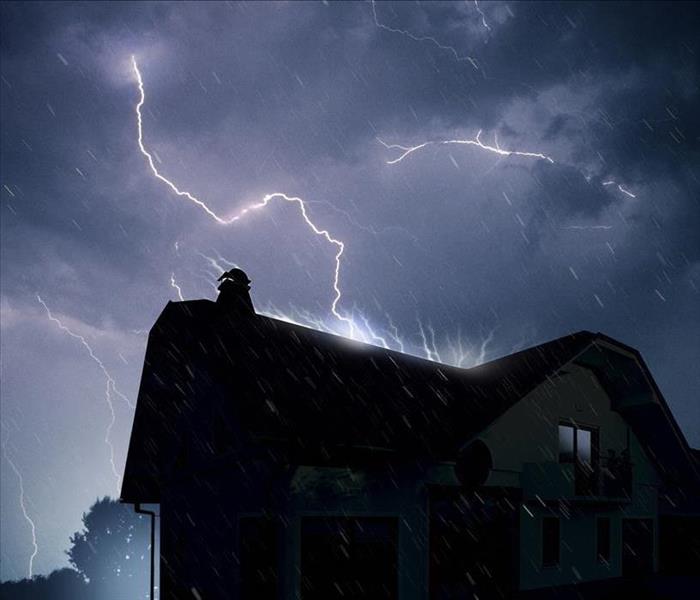 Take some prevention steps to be safe during a storm in your Kaysville, UT home.
Take some prevention steps to be safe during a storm in your Kaysville, UT home.
Although not a high likelihood, virtually all homes are susceptible to being struck by lightning. When it hits, it will take the path of least resistance and could take several different routes through your Kaysville, UT, house. Many parts of a home are conductive, meaning a strike can send a bolt of electricity through electrical lines, phone lines, water pipes, gas pipes, metal framing, gutters, and downspouts, potentially causing a lightning fire. Surprisingly, it can also branch out into more than one path. It has even been known to jump from one course to another through the air (e.g., from a sink to an electrical outlet). This phenomenon is called a side flash. Fortunately, you can take measures to stay safe during a storm and avoid a house fire.
How Can I Keep My Family Safe From Lightning at Home?
You can get a protection system for your home to guard you against a potential strike. However, these systems must be professionally installed, and they are typically very expensive. Usually, it's more cost-effective to be mindful of harmful practices, be aware of safety steps, and ensure that your homeowners insurance covers electrical storms.
1. Avoid Direct Contact With the Ground or Concrete
Many people don't realize that walking in a basement or garage without shoes can be a hazard. An electric current can travel through the soil and be attracted to even slightly damp concrete. Also, avoid walking without shoes on a patio or the ground outside.
2. Avoid Corded Telephones
One of the riskiest activities during a storm is using a corded telephone. Lightning can come through the phone line, striking whoever is talking on it. If you must make or take a call, be sure to use a cordless phone or a cellphone.
3. Avoid Having Direct Contact With Any Wired Electronics
A home's electrical system is a prime target during a storm and can even lead to a lightning fire. Fire damage remediation experts will advise you that you should avoid direct contact with all wired electronics and appliances during a storm. Some of these devices include a computer that's connected to a power outlet directly or via a modem or router that is plugged in, refrigerator, hairdryer, or plugged-in power tool (e.g., an electric drill). You can safely use wireless devices that are not plugged into an electrical outlet, such as cordless phones, cell phones, laptops, tablets, and remote controls.
4. Stay Away from Metal Framed Windows and Doors
Windows and doors with metal frames can conduct electricity, so you should avoid being close to them. Many people find it tempting to stand by the window to watch the storm, but it could also be dangerous.
5. Avoid Using Plumbing
Plumbing is an excellent electrical pathway, so direct contact with it should be avoided during a storm. Taking a shower or bath, doing dishes and even washing your hands could potentially be dangerous.
Your home should be relatively safe from a lightning fire. However, it's better to practice safety all the time. These steps are excellent ways to get started.
How To Clean Household Contents Post-Fire
8/18/2021 (Permalink)
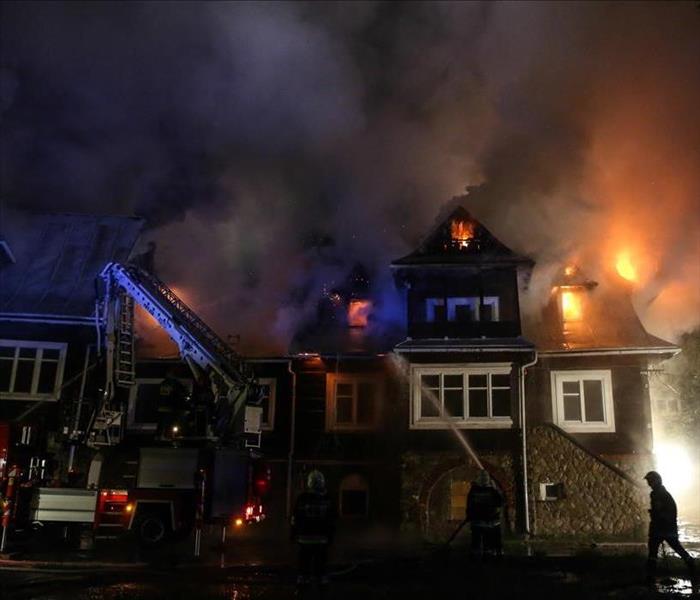 Some items can be salvaged after a fire in your Layton, UT, home.
Some items can be salvaged after a fire in your Layton, UT, home.
When your Layton, UT, home sustains a fire, it's not only the structure of the house itself that is affected, and not only the direct burning from the fire that causes damage. In addition to the fire consuming many, if not most, materials, soot residue, and smoke can affect what the fire didn't directly impact. How do you know what to do about the contents of your home after a fire? Can anything be salvaged? Fortunately, even though the situation probably seems hopeless, all hope is not lost. Some items are salvageable, thanks to content restoration methods like dry-cleaning and odor removal. Here are some everyday household items and how to best manage them after a fire to keep everyone safe and salvage as much as possible in the process.
1. Non-Perishable Food
You may believe that sealed, non-perishable food is still safe after a fire, but it could be very toxic. Open containers must be discarded. Even food in unopened aluminum cans can be susceptible to toxic fumes. Inspect every item in your kitchen for heat damage, smoke, firefighting chemical damage, and water. If you are unsure something has come in contact with any of these contaminants, you must throw it out.
2. Perishable Food
If smoke and soot have penetrated the refrigerator's seals, everything in the refrigerator must be discarded. Additionally, in many instances, a house will lose electricity during a fire, which means the refrigerator will be without power for some amount of time. In this case, it's critical to throw away all the food in the refrigerator and any defrosted food from the freezer.
3. Burned Clothing and Textiles
Burned or charred clothing and other textiles are not salvageable. Some of these materials that have only been exposed to heat, smoke, and soot can be saved using proper cleaning and disinfection methods. Fire restoration professionals are your best bet for keeping as much as possible and returning it as much as possible to its original condition. Remediation experts have dry-cleaning and other specialized equipment to thoroughly clean, sanitize and remove odors. Content storage is also an often necessary service they provide.
4. Appliances and Electronics
Smoke can seriously damage electronic components, so some or all of your appliances and electronics are likely to be unsalvageable. Smoke particles act as conductors which disrupt the electrical pathways, causing the unit to short-circuit. Due to their chemical makeup, smoke and soot are extremely challenging to remove, especially from porous materials. In addition, the effects can be cumulative, only progressing as the smoke and soot are left to linger.
5. Medicine and Cosmetics
Any medications and cosmetics that have been exposed to heat, smoke, soot, or fire extinguishing material must be discarded. It's dangerous to use these products after heat exposure because heat can alter the chemical composition of the products. If these chemicals are ingested or absorbed by a person or animal's skin, they could be toxic.
Fire can cause several different types of damage to a home's contents. Unfortunately, most items are not going to be salvageable. However, dry-cleaning and other professional content cleaning methods can be effective and are worth trying, especially for those irreplaceable and sentimental pieces.
The Great Divide: Responsibilities of Tenants and Owners After a Fire
7/29/2021 (Permalink)
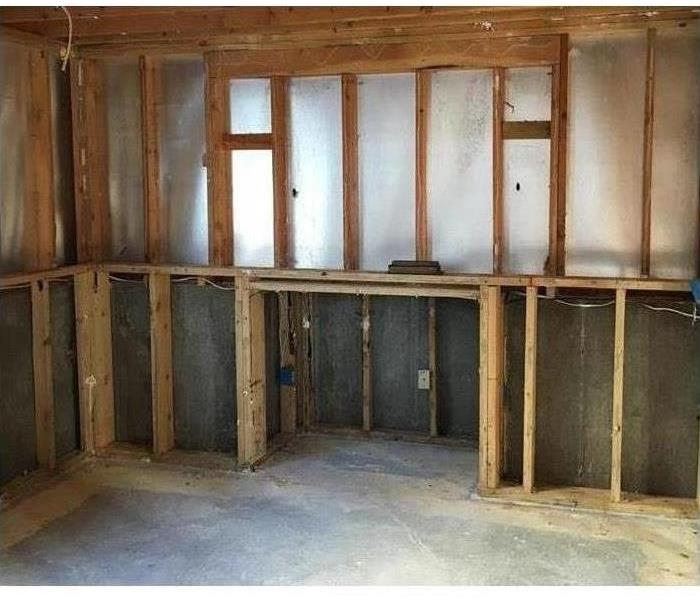 House fire damage in Kaysville, UT
House fire damage in Kaysville, UT
When an apartment fire damages your commercial property in Kaysville, UT, it is likely that both the building and the items inside the affected area are damaged. As the building owner, you are essentially responsible for the building and external structures, whereas your tenants are responsible for their personal items. After the fire has abated, there are things that both you and your tenants need to do.
Owner Responsibilities
Your first action should be to call fire mitigation specialists and your insurance company. This gets both the cleanup process and the means to pay for it started. It also frees you to address other tasks:
- Ask the fire officer for contact information and a time to complete a walkthrough of the property.
- Communicate with tenants to ensure that they are safe and are taking the next steps they need to take.
- During the walkthrough, take pictures and make detailed lists of all the structural fire damage.
- Get a copy of the fire department's report of the incident.
- Put security measures in place to discourage trespassing and further damage.
It is important to know what you need to do after an apartment fire on your commercial property. It is also helpful to understand your tenants' responsibilities.
Tenant Responsibilities
The first thing the tenant should do is secure temporary housing. If they do not have a place to stay and their renter's insurance doesn't cover it, direct them to relief organizations that can assist with temporary housing. Tenants should leave everything affected by the fire in the building so that insurance adjusters can get a clear picture of the damage. Let tenants know that nothing should be removed from the building without the permission of fire officers or the remediation crew.
When an apartment fire ravages your property, you need to have a plan in place for handling the remediation process. Knowing what both you and your tenant need to do can help it run more smoothly.
3 Reasons To Purchase Renters Insurance
5/25/2021 (Permalink)
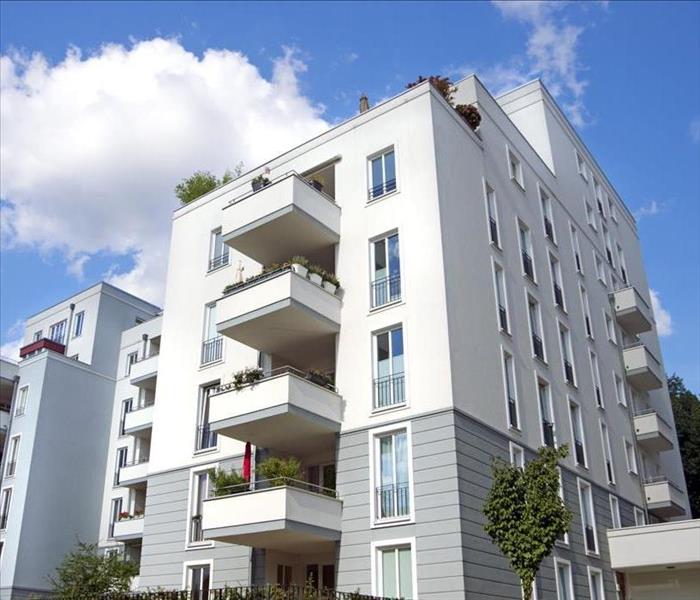 Renters insurance is important.
Renters insurance is important.
If you are renting the home or apartment you live in, you may not think you need property insurance. However, your landlord's insurance only covers the structure and other property that belongs to the landlord. Without renters insurance, there is no protection for damage to your personal property. These are three of the reasons you should consider purchasing this coverage.
3 Reasons to Consider Purchasing Renters Insurance
1. It Pays To Replace Your Stuff
If fire damage were to completely destroy all of your personal belongings, it could cost you thousands of dollars to replace them. A renter's policy covers the cost to replace your personal belongings if they are damaged or destroyed by fire, water, wind or another covered cause of loss. Most policies also protect belongings that are stolen from your residence.
2. The Price Is Reasonable
Because personal belongings are typically worth much less than a house, renters insurance usually costs a fraction of what you would expect to pay for a homeowners policy. The price you pay will depend on how much coverage you need, the deductible and type of coverage you choose and where you live in Layton, UT. If cost is a barrier for you, consider choosing a policy with a higher deductible to save money on premiums.
3. Your Landlord May Require It
Your landlord's policy will pay for fire restoration of the structure; however, it doesn't provide any protection for the property that belongs to tenants. Your landlord or your landlord's insurance company may require that all tenants purchase insurance to cover their own belongings. This requirement should be stated in your rental agreement.
Even if you are not required to purchase renters insurance, it is a good idea to have it. Without this protection, you may have a difficult time replacing your belongings if your home or apartment is severely damaged or destroyed by fire, wind, lightning or another catastrophic event.
5 Ways To Safely Enjoy Candles in Your Home
2/23/2021 (Permalink)
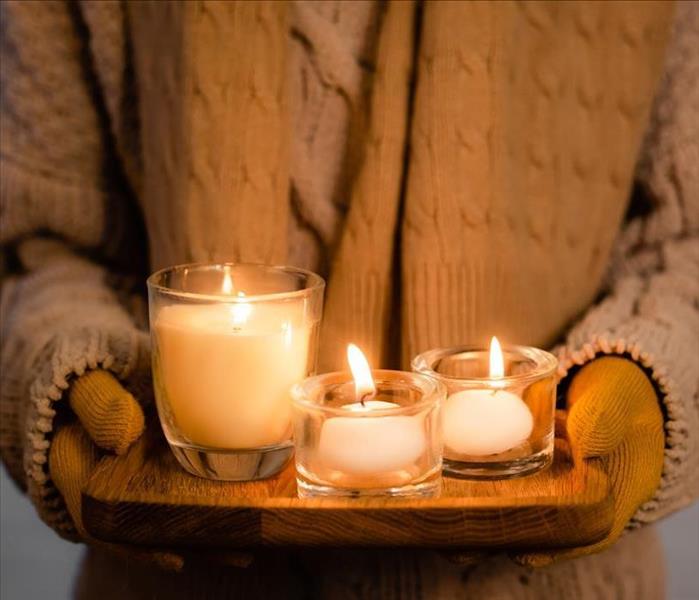 Use candles safely to avoid fire damage in your home.
Use candles safely to avoid fire damage in your home.
There's no doubt that candles have their advantages, such as the beautifully unique ambiance they create and the aromatic scents. Unfortunately, candles aren't always the safest option. Home candle fire risk is real, but if you use precautions, they can be used safely.
5 Ways to Use Candles Safely
1. Keep Candles Away From Air Currents
Place your candle in an area away from open doors or windows, fans, vents or other potential air currents. Drafts can cause excessive dripping of candle wax, uneven burning or flammable materials to blow in the way of the lit candle.
2. Don't Put Out a Candle With Water
Trying to extinguish a candle flame with water can cause splashing of hot wax and possibly cause the candle holder to break due to the temperature difference between the water and heated glass. A snuffer is the best method for putting out a candle safely and causes much less mess.
3. Keep Candles Away From Flammable Materials
Most homes have no shortage of flammable materials, so you must keep candles distanced adequately from anything that could catch fire. Drapes, bedding, paper and loose clothing are typical accidental candle fire starters. Most furniture and rugs can also be risky.
4. Never Leave Candles Unattended
Never leave burning candles unattended, including while you're sleeping. Fire restoration professionals handle enough fire and smoke cleanup to know how many home fires begin when candles are left burning overnight.
5. Keep Candles Out of Reach of Children and Pets
Not only are burning candles dangerous if kids and pets get ahold of them, but they're also at risk of being knocked over even if they're out of reach. Ensure candles are out of high-traffic areas. It can be easy for anyone including furry friends, to bump a candle or piece of furniture on which it's sitting and tip it over.
Ensure that you and your family know about candle fire risks. Understanding the risks and safety practices can go far in preventing a very preventable disaster at your Layton, UT home.






 24/7 Emergency Service
24/7 Emergency Service












